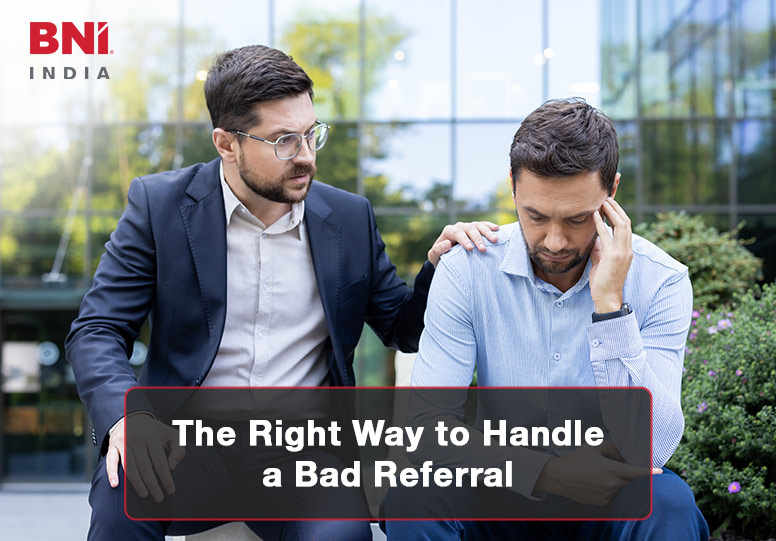Every business owner dreams of receiving referrals that open new doors, spark great conversations, and lead to meaningful collaborations. But every once in a while, a referral doesn’t go as expected. The client might not be the right fit, expectations may clash, or communication could miss the mark. It happens even in the most trusted networks.
But a bad referral doesn’t define your business or your network. What defines you is how you respond, learn, and turn the experience into an opportunity for stronger connections and smarter referral marketing.
Step 1: Pause Before You React
When a referral goes wrong, it’s tempting to jump straight into blame or frustration especially if it costs you time or money. But the best networkers know that calm clarity always wins over emotional reaction.
Take a step back and evaluate what really happened.
Was the client genuinely mismatched with your services?
Did miscommunication happen during the referral handover?
Was there a misunderstanding about timelines, pricing, or expectations?
Pausing gives you perspective and perspective gives you power. It helps you separate the issue from the relationship and keeps your professional reputation intact.
Step 2: Communicate with Kindness and Clarity
Once you’ve gathered the facts, reach out to both the referred client and the member who gave you the referral. Your tone matters more than your words here. Be honest, but never accusatory.
For instance, you can say something like:
“I really appreciate you thinking of me for this referral. It looks like this particular project isn’t the right fit for my services. Can we discuss what the client needed so I can help them better next time?”
That kind of response does two things. It shows maturity and leaves the door open for better referrals in the future. Remember, BNI is built on trust and long-term relationships. One difficult referral handled with grace can actually strengthen trust within your network.
Step 3: Learn from the Experience
Every referral carries a learning opportunity.
Ask yourself:
- Did I communicate clearly what type of client or project I’m best suited for?
- Did I give my fellow members enough details to understand my ideal customer?
- Was there a part of my process that could be improved to manage expectations better?
Bad referrals often highlight a clarity gap, either in how you explain what you do or how others understand it. Once you identify that gap, you can fill it with:-
- Better communication
- Sharper messaging
- Consistent visibility in your BNI chapter.
Step 4: Strengthen Your Network’s Understanding of You
The best way to reduce mismatched referrals is to help your network know you better. Be specific during your weekly presentations. Describe your ideal customer, mention industries you work well with, and share real success stories.
That simple shift helps your partners visualize exactly who they should refer to you. The clearer your ask, the stronger your results.
Step 5: Stay Positive -Every Referral Builds Reputation
Even a referral that didn’t convert can serve a purpose. You never know when the person you met through that “bad” referral might refer you later to someone more suitable. Word-of-mouth travels in unexpected ways.
By staying professional, polite, and grateful, even when things don’t work out, you position yourself as someone people want to refer again. It’s that combination of positivity and professionalism that creates long-term business growth.
Step 6: Practice Accountability
Accountability is one of BNI’s strongest values because it builds reliability within the network.
If a bad referral was partly due to unclear communication or lack of follow-up, acknowledge it and fix it. This simple act shows how responsible you are, and it encourages others to do the same. Over time, that mutual accountability strengthens the entire referral system.
Step 7: Keep the Relationship Alive
A bad referral doesn’t have to mean the end of a connection. Check in with your fellow member after some time, share updates, and show that you value the relationship beyond transactions.
Relationships built through empathy and transparency last longer than those built on immediate results. And that’s where real business networking magic happens, when trust becomes stronger than temporary challenges.
FAQs
1. What should I do first when I receive a bad referral?
Take a moment to understand what went wrong before reacting. Approach the situation calmly and collect the facts before speaking to anyone involved.
2. Should I tell the member who gave me the referral that it didn’t work out?
Yes, but kindly. Give them constructive feedback so they understand how to make better referrals next time.
3. How can I reduce bad referrals in the future?
Be crystal clear about your target audience, the kind of work you do, and the types of referrals you’re looking for. The more specific you are, the better your results.
4. Can a bad referral affect my reputation?
Only if handled poorly. When managed with professionalism and positivity, it actually enhances your credibility within the network.
5. Why is accountability important in referral marketing?
Accountability builds trust. When members own their part of the process — whether giving or receiving referrals — the entire group benefits and grows together.
